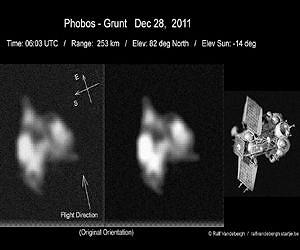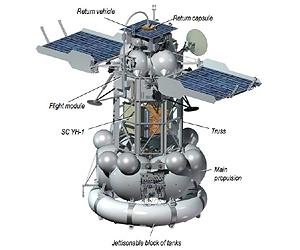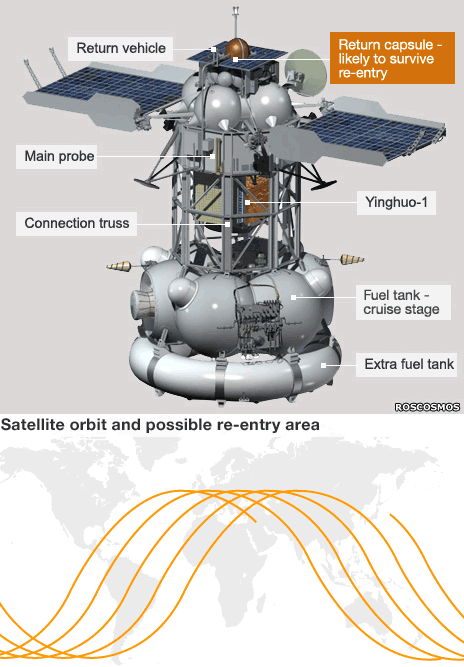seruriermarshal
ACCESS: Top Secret
- Joined
- 4 May 2008
- Messages
- 1,180
- Reaction score
- 574
Published: January 10, 2012 MOSCOW — A Russian scientific spacecraft whizzing out of control around the Earth, and expected to re-enter the atmosphere on Saturday, may have failed because it was struck by some type of antisatellite weapon, the director of Russia’s space agency said in an interview published Tuesday.
He did not say who would want to interfere with the spacecraft, which was intended to explore a moon of Mars.
The Russian craft, named Phobos-Grunt for the moon and the Russian word for ground, ran into trouble soon after it was launched in November, when its rockets failed to lift it out of low Earth orbit. What was to have been a two-and-a-half-year interplanetary journey to retrieve a soil sample from Phobos will instead end over the weekend, according to Russian engineers.
When the 13-ton Phobos-Grunt breaks up in the atmosphere, debris could potentially fall anywhere along a vast stretch of the Earth’s surface that includes the cities of New York, London and Tokyo. Though the odds are heavily against the debris causing any harm, the spectacle of people around the world anticipating the crash is another embarrassment for Roscosmos, the Russian space agency, which has presided over a series of rocket and satellite failures this year.
A statement from the United States Strategic Command acknowledged that it was tracking the space probe and that it is likely to fall in the next week. “Predictions of re-entry date, time and location can change significantly due to many changing factors, such as solar weather and orientation of the spacecraft,” the statement said. “These predictions become more accurate as the event approaches.”
When Phobos-Grunt first went awry, the director of the Russian space agency, Vladimir Popovkin, said that a flawed navigational computer might be to blame.
NASA officials said that they helped Roscosmos, using NASA’s antennas known as the Deep Space Network, to try to re-establish contact with Phobos-Grunt, and that NASA had continued these efforts until the antennas were needed for the launch of its Mars Science Laboratory spacecraft on Nov. 26.
Mr. Popovkin’s remarks to the newspaper Izvestia were the first high-level suggestion of nefarious interference. A retired commander of Russia’s missile warning system had speculated in November that strong radar signals from installations in Alaska might have damaged the spacecraft.
“We don’t want to accuse anybody, but there are very powerful devices that can influence spacecraft now,” Mr. Popovkin said in the interview. “The possibility they were used cannot be ruled out.”
Mr. Popovkin also suggested that equipment on the spacecraft may have broken down while the vehicle was stored on the ground, waiting for the time when Earth and Mars would be in the right places in their orbits for the mission to proceed, something that happens only every two years. “If we had not sent it to Mars in 2011, we would have had to throw it away,” he said of the craft.
The interview came at a time of rising anti-Americanism in Russian politics, and may have been intended mostly for a domestic audience. Russian officials often drop hints of foreign meddling, for example in stirring the recent street protests in Moscow; such comments are usually taken to mean the United States.
Mr. Popovkin’s remarks stood out in stark contrast to the cooperative spirit of recent Russian civilian space endeavors carried out in partnership with NASA, the European Space Agency and other foreign partners. Though Russia maintains a military wing of its space program, confrontation and even competition with the United States in space largely vanished with the end of the cold war.
The two powers called the space race a tie and agreed to build the International Space Station together; now that the American space shuttles are retired, NASA astronauts fly to the station aboard Russian rockets.
Mr. Popovkin did not directly implicate the United States in the interview. But he said “the frequent failure of our space launches, which occur at a time when they are flying over the part of Earth not visible from Russia, where we do not see the spacecraft and do not receive telemetric information, are not clear to us,” an apparent reference to the Americas.
Russia has not succeeded in sending a spacecraft to Mars since the 1980s. An attempt in 1996 to launch a Mars lander that could burrow below the planet’s surface failed because of a flaw in the rocket that carried it.
Phobos-Grunt, which took about five years to build and cost $160 million at current exchange rates, was launched from the Baikonur spaceport in Kazakhstan on Nov. 9; it also carried a small Chinese Mars orbiter.
Kenneth Chang contributed reporting from New York.
http://www.nytimes.com/2012/01/11/science/space/russian-official-suggests-weapon-caused-spacecraft-failure.html
He did not say who would want to interfere with the spacecraft, which was intended to explore a moon of Mars.
The Russian craft, named Phobos-Grunt for the moon and the Russian word for ground, ran into trouble soon after it was launched in November, when its rockets failed to lift it out of low Earth orbit. What was to have been a two-and-a-half-year interplanetary journey to retrieve a soil sample from Phobos will instead end over the weekend, according to Russian engineers.
When the 13-ton Phobos-Grunt breaks up in the atmosphere, debris could potentially fall anywhere along a vast stretch of the Earth’s surface that includes the cities of New York, London and Tokyo. Though the odds are heavily against the debris causing any harm, the spectacle of people around the world anticipating the crash is another embarrassment for Roscosmos, the Russian space agency, which has presided over a series of rocket and satellite failures this year.
A statement from the United States Strategic Command acknowledged that it was tracking the space probe and that it is likely to fall in the next week. “Predictions of re-entry date, time and location can change significantly due to many changing factors, such as solar weather and orientation of the spacecraft,” the statement said. “These predictions become more accurate as the event approaches.”
When Phobos-Grunt first went awry, the director of the Russian space agency, Vladimir Popovkin, said that a flawed navigational computer might be to blame.
NASA officials said that they helped Roscosmos, using NASA’s antennas known as the Deep Space Network, to try to re-establish contact with Phobos-Grunt, and that NASA had continued these efforts until the antennas were needed for the launch of its Mars Science Laboratory spacecraft on Nov. 26.
Mr. Popovkin’s remarks to the newspaper Izvestia were the first high-level suggestion of nefarious interference. A retired commander of Russia’s missile warning system had speculated in November that strong radar signals from installations in Alaska might have damaged the spacecraft.
“We don’t want to accuse anybody, but there are very powerful devices that can influence spacecraft now,” Mr. Popovkin said in the interview. “The possibility they were used cannot be ruled out.”
Mr. Popovkin also suggested that equipment on the spacecraft may have broken down while the vehicle was stored on the ground, waiting for the time when Earth and Mars would be in the right places in their orbits for the mission to proceed, something that happens only every two years. “If we had not sent it to Mars in 2011, we would have had to throw it away,” he said of the craft.
The interview came at a time of rising anti-Americanism in Russian politics, and may have been intended mostly for a domestic audience. Russian officials often drop hints of foreign meddling, for example in stirring the recent street protests in Moscow; such comments are usually taken to mean the United States.
Mr. Popovkin’s remarks stood out in stark contrast to the cooperative spirit of recent Russian civilian space endeavors carried out in partnership with NASA, the European Space Agency and other foreign partners. Though Russia maintains a military wing of its space program, confrontation and even competition with the United States in space largely vanished with the end of the cold war.
The two powers called the space race a tie and agreed to build the International Space Station together; now that the American space shuttles are retired, NASA astronauts fly to the station aboard Russian rockets.
Mr. Popovkin did not directly implicate the United States in the interview. But he said “the frequent failure of our space launches, which occur at a time when they are flying over the part of Earth not visible from Russia, where we do not see the spacecraft and do not receive telemetric information, are not clear to us,” an apparent reference to the Americas.
Russia has not succeeded in sending a spacecraft to Mars since the 1980s. An attempt in 1996 to launch a Mars lander that could burrow below the planet’s surface failed because of a flaw in the rocket that carried it.
Phobos-Grunt, which took about five years to build and cost $160 million at current exchange rates, was launched from the Baikonur spaceport in Kazakhstan on Nov. 9; it also carried a small Chinese Mars orbiter.
Kenneth Chang contributed reporting from New York.
http://www.nytimes.com/2012/01/11/science/space/russian-official-suggests-weapon-caused-spacecraft-failure.html










